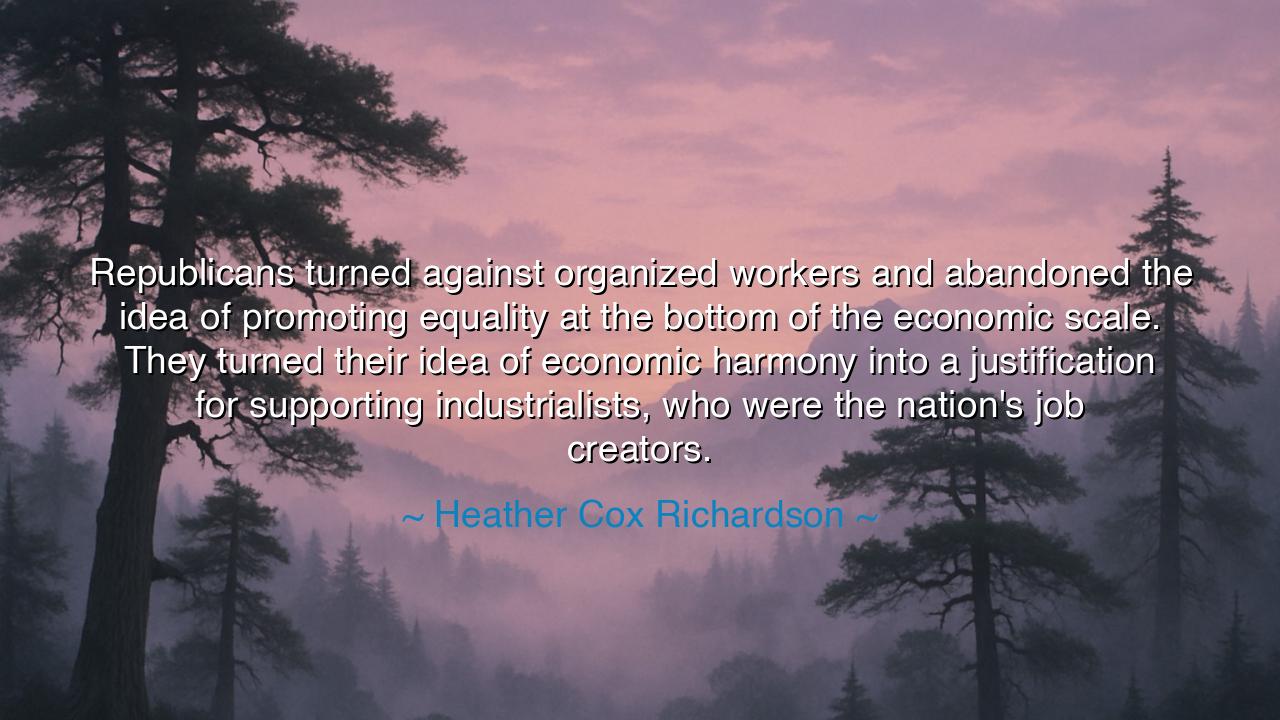
Republicans turned against organized workers and abandoned the
Republicans turned against organized workers and abandoned the idea of promoting equality at the bottom of the economic scale. They turned their idea of economic harmony into a justification for supporting industrialists, who were the nation's job creators.






In the grand struggle between the rich and the poor, between the elite and the working class, few truths are more enduring than the necessity of standing with those who labor to sustain the nation’s wealth. Heather Cox Richardson, in her sobering reflection, speaks to a profound shift in the American political landscape: "Republicans turned against organized workers and abandoned the idea of promoting equality at the bottom of the economic scale. They turned their idea of economic harmony into a justification for supporting industrialists, who were the nation's job creators." Her words, though rooted in contemporary politics, echo with ancient wisdom, for this very struggle has existed across civilizations: the tension between those who have and those who labor, and the moral choices societies must make to ensure justice for all.
In the time of the Romans, the struggle between the plebeians and the patricians was a central feature of society. The plebeians, the working class, were often denied power, living under the oppression of a system that favored the wealthy elite. Yet, through their unity and struggle, they fought for reforms, pushing for the Twelve Tables, the first written law code that sought to grant them basic rights. It was the laborers, the common folk, who were the backbone of the empire, yet it was the elites—the landowners and industrialists—who controlled the wealth and power. In the same way, Richardson’s words remind us that the working class is essential to the survival of any economy, yet their value is often overlooked in favor of those who already hold wealth.
This abandonment of equality is not a new phenomenon. The ancient Greeks, too, grappled with the idea of economic justice. In Plato’s Republic, he warned of the dangers of unchecked wealth and the corruption that often followed in its wake. Plato understood that when wealth is concentrated in the hands of a few, the harmony of society is broken, and the gap between the powerful and the powerless becomes insurmountable. He also understood that the ideal society required a balance—a society where the working class was not left behind but uplifted, where equality was not just an ideal for the elite but a necessity for the harmony of the whole. Yet, as Richardson highlights, the modern-day rejection of this principle has led to a growing divide between the powerful and the powerless, where the industrialists—those who control the means of production—are seen as the true creators of wealth, leaving the workers to struggle for scraps.
Consider, if you will, the Gilded Age in American history—a time when industrialists like John D. Rockefeller, Andrew Carnegie, and J.P. Morgan amassed unimaginable wealth while the working class toiled in dangerous factories for meager wages. During this era, the ideals of equality were often forgotten in favor of the economic harmony that Richardson describes—a harmony that favored the wealthy and justified the exploitation of workers. Labor unions emerged as a response to this injustice, as workers sought to organize and demand better wages, safer working conditions, and fair treatment. Yet, even in the face of these struggles, many in power—especially those with political influence—continued to support the industrialists, justifying the suffering of workers with the argument that the rich were the job creators, and thus their prosperity was vital for the health of the economy.
This notion of job creators is as old as the idea of power itself. In ancient Egypt, the pharaohs were seen as the providers of all that was good in the kingdom, yet it was the laborers, the farmers and builders, who constructed the temples and pyramids that marked the nation’s glory. The disparity between the rulers and the ruled was immense, yet the rulers justified their power by claiming that they were the source of prosperity. This idea was echoed through the centuries, especially during the Industrial Revolution, where the industrialists’ claims of creating wealth were used to justify their monopoly on power. But history teaches us that this system cannot endure, for a society in which only the wealthy flourish while the working class suffers is one that is bound to break.
The lesson Richardson’s words impart is a reminder that true economic harmony cannot exist when equality is abandoned. A society where wealth and power are concentrated in the hands of a few, while the working class is left to struggle, is a society that is doomed to fracture. As the ancients knew, true harmony and prosperity are achieved not through the exploitation of the many for the benefit of the few, but through the uplifting of the whole, where each person, regardless of their class or status, has access to justice, opportunity, and the ability to live a life of dignity.
Let us then take action in our own time, recognizing the truth that equality is not a gift that can be handed down from the powerful, but a right that must be fought for by all. We must work to ensure that the laborers, the builders of our society, are not left behind but are empowered to thrive. Just as the ancients fought for a balance between the elite and the working class, so too must we fight for a world where true economic equality is not just a dream, but a reality. By doing so, we will honor the legacy of those who came before us and build a society where prosperity is shared, where justice is real, and where the dignity of every individual is upheld.






AAdministratorAdministrator
Welcome, honored guests. Please leave a comment, we will respond soon